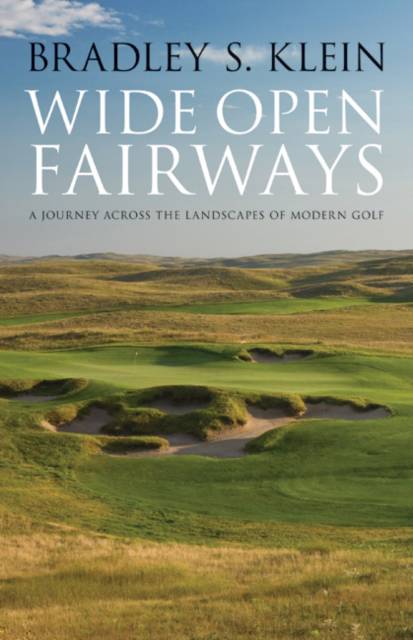
Door een staking bij bpost kan je online bestelling op dit moment iets langer onderweg zijn dan voorzien. Dringend iets nodig? Onze winkels ontvangen jou met open armen!
- Afhalen na 1 uur in een winkel met voorraad
- Gratis thuislevering in België vanaf € 30
- Ruim aanbod met 7 miljoen producten
Door een staking bij bpost kan je online bestelling op dit moment iets langer onderweg zijn dan voorzien. Dringend iets nodig? Onze winkels ontvangen jou met open armen!
- Afhalen na 1 uur in een winkel met voorraad
- Gratis thuislevering in België vanaf € 30
- Ruim aanbod met 7 miljoen producten
Zoeken
Wide Open Fairways
A Journey Across the Landscapes of Modern Golf
Bradley S Klein
Hardcover | Engels
€ 48,45
+ 96 punten
Omschrijving
In golf the playing field is also landscape, where nature and the shaping of it conspire to test athletic prowess. As golf courses move away from the "big business, pristine lawn" approach of recent times, Bradley S. Klein, a leading expert on golf course design and economics, finds much to contemplate, and much to report, in the way these wide-open spaces function as landscapes that inspire us, stimulate our senses, and reveal the special nature of particular places.
A meditation on what makes golf courses compelling landscapes, this is also a personal memoir that follows Klein's own unique journey across the golfing terrain, from the Bronx and Long Island suburbia to the American prairie and the Pacific Northwest. Whether discussing Robert Moses and Donald Trump and the making of New York City, or the role of golf in the development of the atomic bomb, or the relevance of Willa Cather to how the game has taken hold in the Nebraska Sandhills, Klein is always looking for the freedom and the meaning of golf's wide-open spaces. And as he searches, he offers a deeply informed and absorbing view of golf courses as cultural markers, linking the game to larger issues of land use, ecology, design, and imagination.
A meditation on what makes golf courses compelling landscapes, this is also a personal memoir that follows Klein's own unique journey across the golfing terrain, from the Bronx and Long Island suburbia to the American prairie and the Pacific Northwest. Whether discussing Robert Moses and Donald Trump and the making of New York City, or the role of golf in the development of the atomic bomb, or the relevance of Willa Cather to how the game has taken hold in the Nebraska Sandhills, Klein is always looking for the freedom and the meaning of golf's wide-open spaces. And as he searches, he offers a deeply informed and absorbing view of golf courses as cultural markers, linking the game to larger issues of land use, ecology, design, and imagination.
Specificaties
Betrokkenen
- Auteur(s):
- Uitgeverij:
Inhoud
- Aantal bladzijden:
- 216
- Taal:
- Engels
Eigenschappen
- Productcode (EAN):
- 9780803240377
- Verschijningsdatum:
- 1/09/2013
- Uitvoering:
- Hardcover
- Formaat:
- Genaaid
- Afmetingen:
- 164 mm x 232 mm
- Gewicht:
- 480 g

Alleen bij Standaard Boekhandel
+ 96 punten op je klantenkaart van Standaard Boekhandel
Beoordelingen
We publiceren alleen reviews die voldoen aan de voorwaarden voor reviews. Bekijk onze voorwaarden voor reviews.











